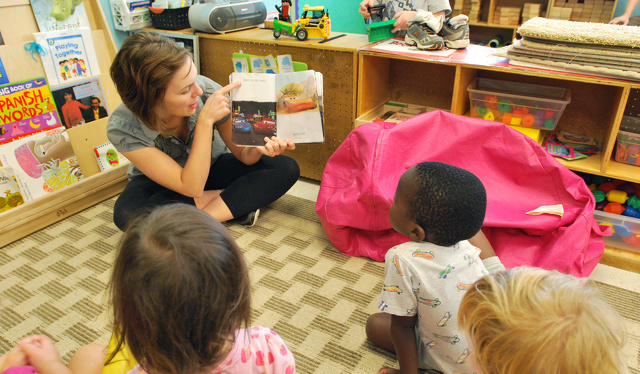Preschool Academic Skills Improve Only When Instruction Is Good to Excellent
Study also finds that children show larger gains in academic skills with more time in Head Start.
 New research combining eight large child care studies reveals that preschools prepare children to succeed academically when teachers provide higher quality instruction.
New research combining eight large child care studies reveals that preschools prepare children to succeed academically when teachers provide higher quality instruction.
Margaret Burchinal, senior scientist at the Frank Porter Graham Child Development Institute at the University of North Carolina at Chapel Hill, led a research team whose findings have groundbreaking implications for publicly-funded early care and education. They found as the overall quality of instruction in preschool classrooms increases, children experience better outcomes across a range of skills, but the needle only moves on language and reading skills when instructional quality is at or above a threshold.
“Preschoolers in center-based care showed larger gains in reading and language when their teachers spent more time supporting their learning—but only if the quality of instruction was in the moderate to high range,” Burchinal said.
Burchinal’s co-authors included Martha Zaslow of Child Trends and Louisa Tarullo of Mathematica Policy Research. Their team also found that children appeared to benefit from a larger “dose” of center-based child care.
“Children showed larger gains in academic skills when they attended more than one year of Head Start, had fewer absences, and spent more time in reading and math instruction,” Burchinal said. “Early childhood education is widely accepted as an effective way to improve opportunities for all children, and this finding about Head Start supports the growing trend of two years of publicly funded preschool for children from low-income homes.”
Burchinal explained that unlike most of the Head Start classrooms in her study, some programs do not meet a threshold of quality, offer a second year, or provide sufficient time in math and reading instruction to enable children to make academic gains.
“The lowest quality programs are going to have to change a lot in order for us to likely see the kind of improvement in language and academic skills that provide the foundation for succeeding in school,” Burchinal said. “Children in our study showed the largest gains when teachers interacted with children frequently in engaging activities that were designed to teach those language and academic skills deliberately.”
Burchinal explained that if lower-quality preschool classrooms do not improve children’s reading and language skills, this could inform the conceptualization and design of publicly funded programs—as well as efforts to improve existing learning opportunities for children. Shifting the field’s current focus from overall quality and instead zeroing in on content may be more effective in promoting children’s academic learning.
 “At present, our field focuses on broader classroom quality and teacher-child interactions,” she said. “Our study found that only small gains in language and literacy outcomes were associated with higher quality interactions between teachers and children, but large gains were associated with high quality instruction in those areas. Having a sensitive caregiver is really important for young children—but it probably isn’t sufficient alone for promoting academic skills. There has to be content and an intentional approach to instruction.”
“At present, our field focuses on broader classroom quality and teacher-child interactions,” she said. “Our study found that only small gains in language and literacy outcomes were associated with higher quality interactions between teachers and children, but large gains were associated with high quality instruction in those areas. Having a sensitive caregiver is really important for young children—but it probably isn’t sufficient alone for promoting academic skills. There has to be content and an intentional approach to instruction.”
Burchinal, Zaslow, and Tarullo published their study, “Quality Thresholds, Features, and Dosage in Early Care and Education: Secondary Data Analyses of Child Outcomes,” in a special monograph for the Society for Research in Child Development.
Contact:
Margaret Burchinal, Senior Scientist
Frank Porter Graham Child Development Institute
University of North Carolina at Chapel Hill
burchinal@unc.edu
919-966-5059
Members of the media also can contact Dave Shaw (FPG's communication director) for a PDF of the study: Dave@unc.edu
Research reported in this publication was supported primarily by the U.S. Department of Health and Human Services, Administration for Children and Families, Office of Planning, Research and Evaluation: Contract Number HHSP23320095642WC awarded to Mathematica Policy Research and partners Child Trends and the University of North Carolina-Chapel Hill (UNC-CH). Additional support came from the Institute for Education Sciences–funded postdoctoral fellowship R305B100028 award to UNC-CH. The original data collection for the Georgia Pre-Kindergarten Evaluation study was supported by funding from Bright from the Start: Georgia Department of Early Care and Education, Contract #46900-621-V12UNC009, awarded to UNC-CH. The original data collection for the NC Pre-Kindergarten Evaluation studies was supported by funding from the NC Department of Health and Human Resources and the More at Four Program, Contract #2090002872, and from the NC Department of Public Instruction, Contract #EP4468139, awarded to UNC-CH. The content is solely the responsibility of the authors and does not represent the official views of these funders. We thank the researchers, programs, and families that participated in the studies included in the meta-analyses.
FPG grants permission to republish this story in whole or in part.
